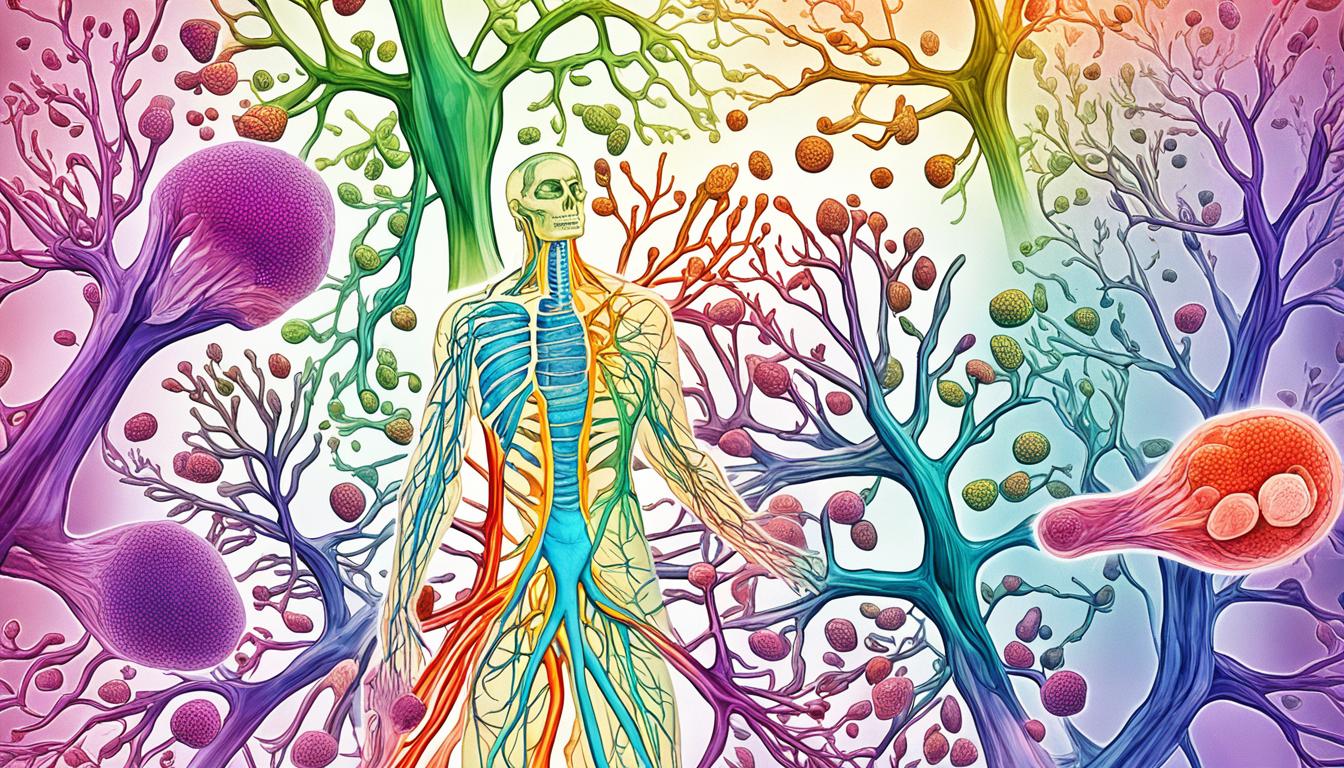Multiple endocrine neoplasia type 1, or MEN1, is a rare genetic disorder. It’s passed down in families and leads to tumors in different endocrine glands. These include the parathyroid and adrenal glands, pancreas, and the pituitary gland. The main cause is mutations in the MEN1 gene.
Certain tumors related to MEN1, like those found in the thymus and pancreas, are particularly serious. They are hard to treat and can spread. Catching and treating these tumors early is key to better health outcomes.
Key Takeaways:
- MEN1 is an inherited disorder characterized by the occurrence of tumors in multiple endocrine glands.
- The most harmful tumor types in MEN1 are thymic carcinoid tumors and pancreatic-duodenal gastrinomas.
- MEN1 is caused by germline mutations of the MEN1 tumor suppressor gene.
- Early detection of MEN1-associated tumors through mutation analysis enables timely intervention and treatment.
- Periodical clinical monitoring of MEN1 gene mutation carriers is essential for early tumor detection and management.
Clinical Presentation and Diagnostic Methods of MEN1
People diagnosed with MEN1 often have tumors in different glands and parts of their body. These include the parathyroid, pancreas, pituitary gland, adrenal glands, and neuroendocrine carcinoid tumors. Tumor growth can cause various symptoms.
Some symptoms of MEN1 are linked to having too much calcium in the blood, known as hypercalcemia. This can make people feel tired, weak, and experience kidney stones. Tumors in pancreas can also cause hormone issues leading to low blood sugar or gastric ulcers.
Doctors diagnose MEN1 by checking for certain criteria. They look for signs of tumors in at least three out of the five main affected areas. Or, they might find tumors in two areas with a close relative also diagnosed. Genetic tests can confirm this diagnosis.
If someone is found to have a MEN1 gene mutation, regular check-ups are advised. These check-ups involve blood tests, imaging, and keeping track of hormone levels. Early monitoring and treatment help improve outcomes.
For those with a family history or suspected of carrying the mutation, genetic counseling is vital. It helps understand the risks and possible steps to protect other family members. This service offers important information on how MEN1 might pass down in families.
Diagnostic Methods of MEN1:
- Clinical evaluation, including a check-up and history review
- Blood tests to check hormone levels and any signs of imbalance
- Imaging studies like CT scans, MRIs, and ultrasounds for detailed views
- Genetic testing to specifically look for MEN1 gene changes
| Tumor Type | Clinical Presentation |
|---|---|
| Parathyroid Gland Tumors | Hypercalcemia, fatigue, weakness, kidney stones |
| Pancreatic Islet Tumors | Hypoglycemia, Zollinger-Ellison syndrome |
| Pituitary Gland Tumors | Endocrine dysfunction, visual disturbances |
| Adrenal Gland Tumors | Cushing’s syndrome, pheochromocytoma |
| Neuroendocrine Carcinoid Tumors | Varies depending on location |
Treatment Options and Prognosis of MEN1
The way we treat tumors linked to MEN1 depends on the type of tumor. The main way is to take out the tumors through surgery, which sometimes leads to a cure. But sometimes, doctors can also use medicine or radiation to help.
Your doctor will help pick the best treatment for you. Because each case is different, getting expert advice is important.
For people with MEN1, how things turn out can be different for each person. The type and stage of the tumors, how well the treatment works, and your general health all play a part. Watching your health closely, finding problems early, and treating them quickly can help a lot.
Scientists are always looking for new ways to treat MEN1. They want to find better ways to diagnose it, treat it, and maybe understand it better. This could lead to better outcomes and new treatments.
Support groups and help are out there for people with MEN1 and their families. They offer advice, information, and a shoulder to lean on. It’s a way to connect with others who are going through the same thing.
FAQ
Q: What is Multiple Endocrine Neoplasia type 1 (MEN1)?
A: MEN1 is a disorder that runs in families. It causes tumors in parts like the parathyroid glands and pancreas. It also affects the pituitary and adrenal glands, leading to a mix of symptoms.
Q: What are the symptoms of MEN1?
A: Symtoms of MEN1 change based on the tumors someone has. They might include problems with the parathyroid glands, pancreas, or adrenal glands. Others might notice issues with their pituitary gland or neuroendocrine system.
Q: How is MEN1 diagnosed?
A: Doctors look for certain signs to diagnose MEN1. These signs often involve the parathyroid and pituitary glands. Also, they check if there’s a family history of similar issues.
They may do a genetic test to confirm the diagnosis. This is especially for those with a known family history of MEN1.
Q: What are the treatment options for MEN1?
A: Treating MEN1 often involves surgery to remove affected areas. This is key for managing the disease. Yet, some might also need medications or radiation, depending on their condition.
Q: What is the prognosis for individuals with MEN1?
A: The outcome for people with MEN1 varies. It’s influenced by the tumor type and how early it’s caught. Treatment success and the person’s general health also shape the outlook.
Q: Is there ongoing research on MEN1?
A: Research into MEN1 is active. Scientists aim to find better ways to diagnose and treat it. They also work to understand what causes this disorder.
Q: Are there support groups available for individuals and families affected by MEN1?
A: Yes, there are support groups for MEN1 patients and their families. They offer information, advice, and emotional help. This support is crucial for those facing the challenges of MEN1.

